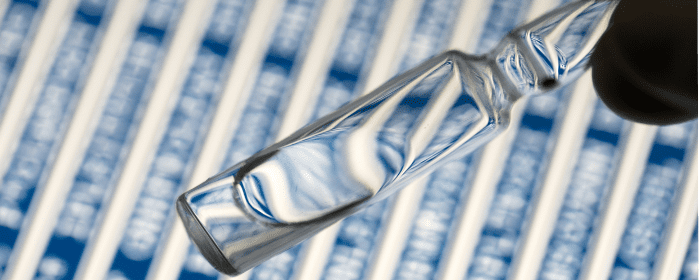With nearly 1.5 million traumatic brain injuries (TBI) occurring each year in the United States and over 69 million more cases of TBI[1] occurring worldwide, TBI continues to be one of the leading annual causes of mortality and morbidity. Carrying with it an annual estimated cost exceeding $56 billion, there has yet to be a viable, effective treatment option for TBI.
As researchers continue to search for an effective pharmacological-based treatment for TBI, recent preclinical studies have found endogenous neurorestoration occurring after TBI. Treatments developed in an effort to improve and/or promote the post-TBI neurorestorative recovery process have also shown to be promising.
Of the potential regenerative peptides identified as part of the TBI recovery efforts, thymosin beta 4 (Tβ4) has been found to exhibit several interesting and promising benefits, including pro-survival and pro-angiogenic properties, protecting tissue against damage, and promoting tissue regeneration.
In addition, previous studies exploring Tβ4 as a potential TBI-treatment option have demonstrated reduced inflammation, improved remyelination, and improved recovery in animal models studying such effects. As a result, the authors of this brief conclude that these observed benefits indicate Tβ4 to hold tremendous potential as a treatment option for TBI.
Since there isn’t one established animal model that can clinically reproduce the significant and multi-layered deficits in cognitive and motor performance experienced as a result of TBI in humans, most TBI studies rely on the controlled cortical impact, or CCI, model to evaluate the efficacy of potential TBI treatments.
Early Tβ4 Treatment May Reduce Cortical lesion Volume and Improve Functional Recovery After TBI
Using the CCI model to evaluate the efficacy of early Tβ4 treatment on spatial learning and sensorimotor functional recovery in rats, the authors demonstrated that rats receiving (Tβ4) treatments 6, 24, and 48-hours after TBI demonstrated significant improvements, especially when compared to rats treated with a vehicle control (in this case, saline). Rats in the Tβ4-treated group also demonstrated reduced hippocampal cell loss and reduced cortical lesion volume at a rate of up to 30%.
As a result of these findings, the authors suggest Tβ4 may encourage neuroprotection even when treatment is provided up to 6-hours after the occurrence of a TBI.
Tβ4 Treatment Provided 24-Hours After TBI Injury May Improve Functional Recovery, But Not Alter Cortical Lesion Volume
The primary intent of any neuroprotective TBI treatment is to reduce the size of established lesion(s). Researchers note that a major, but recurring, limitation of TBI-based treatments is the short timeframe between injury and need for treatment. As such, researchers point out that most preclinical TBI studies found the treatment to be effective only when administered within several hours after experiencing a TBI.
However, when using the CCI model, researchers noted the ability to improve neurological recovery without altering cortical lesion volume; these improvements were observed even when administering Tβ4 treatment more than 24-hours after injury.
Specifically, rats receiving Tβ4 treatment initiated 24 hours post-injury demonstrated significantly reduced cell loss as well as improvement in spatial learning and sensorimotor functional recovery when compared to TBI rats receiving saline treatments.
Tβ4 Treatment Provided 24-Hours After TBI Injury May Promote Neurogenesis
Substantial evidence has repeatedly indicated that all mammals, including humans, have the ability to generate new neurons. Specifically, these neurons originate from neural stem cells in the adult brain and appear to replace neurons that die regularly and in specific areas of the brain.
Considering this information, scientists introduced bromodeoxyuridine (BrdU), a thymidine analogue, into the DNA of dividing cells with the goal of improving neurogenesis. When compared to sham controls, this process demonstrated a significant increase in the presence of BrdU-positive cells 35 days after TBI.
Additionally, Tβ4 treatment appeared to further increase the number of BrdU-positive cells when compared to saline controls. These findings were further supported by the authors’ data confirming neurogenesis increases in TBI rats receiving Tβ4 treatment. The authors suggest that these findings indicate Tβ4 treatment promotes new cells to differentiate into brain-specific neurons.
Tβ4 Treatment Provided 24-Hours After TBI Injury May Promote Angiogenesis
Research demonstrates normal adult brains contain a stable vascular system; however, the vascular system becomes active in response to several pathological conditions, one of them being TBI. Findings indicate that Tβ4 treatment applied to specific areas of the brain associated with TBI, including the cortex, demonstrate significant increases in the observed vascular density of these specific areas, especially when compared to a control group receiving a saline treatment.
The presence of increased vascular density in these areas of the brain is thought to be closely related to improved recovery from TBI and specifically enhanced neurogenesis and synaptogenesis. As a result, the authors of this brief suggest further study to attain a better understanding of neurovascular molecular mechanisms with a specific focus on developing angiogenic and neurogenic therapies for TBIs.
Considering the above findings pertaining to the potential benefits of Tβ4 treatment for TBI and the fact that administration of Tβ4 has proven safe and well-tolerated in both animals and humans, the authors call for further investigation of molecular mechanisms that contribute to enhanced Tβ4-mediated neuroprotection and neurorestoration.
Source: (n.d.). Neuroprotective and neurorestorative effects of Thymosin beta 4 …. Retrieved February 4, 2021, from https://www.ncbi.nlm.nih.gov/pmc/articles/PMC3547647/
[1] “Estimating the global incidence of traumatic brain injury – PubMed.” 1 Apr. 2018, https://pubmed.ncbi.nlm.nih.gov/29701556/.


 St. Petersburg, Florida
St. Petersburg, Florida
